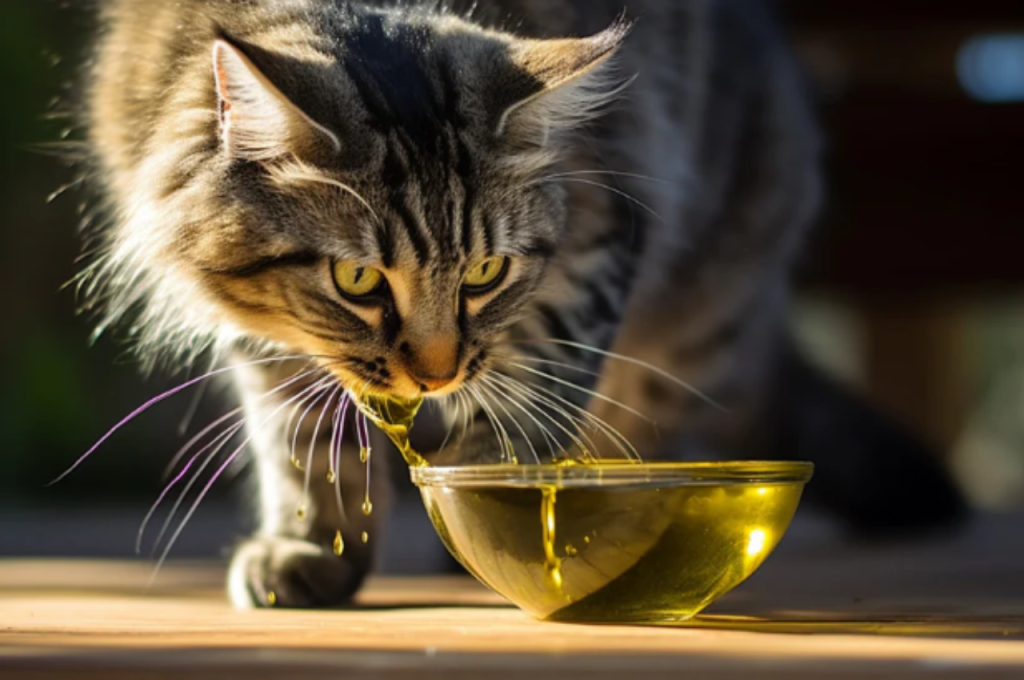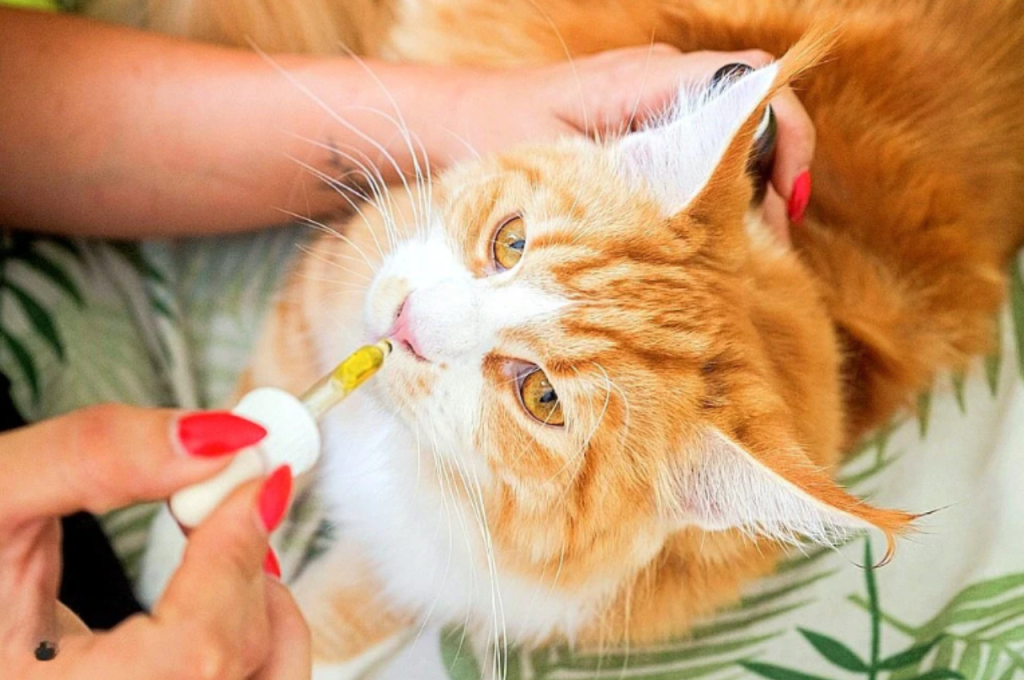Yes, cats can have olive oil in moderation as it can provide health benefits for them. Olive oil is a safe and natural way to help improve a cat’s skin and coat health due to its omega-3 fatty acids.
However, it is important to only give your cat small amounts of olive oil as too much can cause digestive issues. Always consult your veterinarian before adding any new food to your cat’s diet to ensure it is safe for them.
Overall, incorporating a small amount of olive oil into your cat’s diet can have positive effects on their overall health and well-being while keeping them looking and feeling their best.
Benefits of Olive Oil for Cats
Olive oil, a staple in Mediterranean cuisine, is renowned for its numerous health benefits for humans. But can olive oil offer similar advantages for our feline companions? In this article, we’ll delve into the potential benefits of olive oil for cats and how it can contribute to their overall health and well-being.

Rich in Healthy Fats
Olive oil is renowned for its rich content of beneficial healthy fats, making it a popular choice for supporting a cat’s overall well-being. This natural oil is packed with monounsaturated fats, which can contribute to a healthy coat and skin for your feline friend.
Improves Skin and Coat Health
Incorporating olive oil into your cat’s diet can lead to noticeable improvements in their skin and coat health.
Boosts Immune System
Olive oil enhances a cat’s immune system, helping them stay strong and healthy. Olive oil contains powerful antioxidants, such as vitamin E and polyphenols, which help to strengthen the immune system and protect against oxidative stress and inflammation.
Risks of Olive Oil for Cats
When it comes to the health of our feline friends, it’s important to be knowledgeable about the risks associated with certain foods we commonly consume. Olive oil, a staple in many kitchens, may seem harmless, but it can pose risks for cats if not used properly. This article will explore the potential dangers of olive oil for cats, particularly to digestive issues, weight gain, and the potential for toxicity.
Digestive Issues
Feeding olive oil to your cat can potentially lead to digestive issues. Cats have a sensitive digestive system, and introducing new substances, especially in large amounts, can disrupt their digestive process. Olive oil is high in fat, which can be difficult for cats to digest, causing discomfort, nausea, and even diarrhea.
Weight Gain
Overconsumption of olive oil can contribute to weight gain in cats. While small amounts of olive oil can be beneficial for their coat and overall skin health, excessive consumption can lead to an increase in calorie intake. It’s important to remember that cats have specific dietary needs, and an unbalanced diet can lead to obesity and related health problems.
Toxicity
Although olive oil is generally safe for humans, it can be toxic to cats if ingested in large amounts. Cats’ bodies are not designed to metabolize certain compounds found in olive oil, such as phenols and oleuropein. These substances can cause oxidative damage to feline cells and potentially lead to health issues.
It’s crucial to note that even small amounts of olive oil should be used sparingly and only under the guidance of a veterinarian. If you suspect your cat has consumed a significant amount of olive oil or is showing any signs of distress, it’s essential to seek immediate veterinary care.
How to Safely Feed Olive Oil to Cats
Feeding olive oil to cats can be done safely in moderation, as it provides healthy fats and aids digestion. It’s best to consult a veterinarian for proper dosage and to ensure your cat’s specific needs are met. When introducing olive oil, start with small amounts and observe your cat for any adverse reactions before increasing.

Consulting A Vet First
Olive oil can be beneficial for cats in moderation, but it’s important to consult a veterinarian before adding it to their diet. The vet can assess your cat’s health and provide personalized recommendations.
Choosing The Right Type of Olive Oil
When selecting olive oil for your cat, opt for extra virgin olive oil, as it is the purest form and has the highest level of nutrients. Avoid using flavored or infused olive oils, as they may contain additives that could be harmful to your cat.
Moderation is Key
Feeding olive oil to your cat should be done in moderation. Incorporate it into their diet in small amounts, such as drizzling a small quantity over their food to provide potential health benefits without causing any adverse effects.
Incorporating Olive Oil into Your Cat’s Diet
Cats can benefit from the addition of olive oil to their diet. When used in moderation, this natural oil can support your feline friend’s overall health. Here are a few ways you can incorporate olive oil into your cat’s diet:
Mixing with Food
Mixing a small amount of olive oil into your cat’s regular food can contribute healthy fats to their diet. Start with a tiny portion, such as 1/4 teaspoon, and observe how your cat responds before gradually increasing the amount.
Using As a Treat
Olive oil can serve as a special treat for your cat. You can offer a small amount on a spoon or add a drizzle to their food as a delicious and beneficial indulgence.
Adding to Homemade Cat Food Recipes
If you prepare homemade cat food, incorporating olive oil into the recipes can enhance the nutritional value. Be sure to follow appropriate portion guidelines to maintain a balanced diet for your furry companion.
Signs Your Cat Might Benefit from Olive Oil
If your cat is experiencing dry skin or digestive issues, adding a small amount of olive oil to their diet could be beneficial. Signs your feline friend might benefit from olive oil include dull coat, constipation, or hairball struggles. However, it’s important to consult a veterinarian before making any dietary changes for your cat.
Dry Skin
Cat is suffering from dry skin, olive oil can offer a natural solution to moisturize and soothe their skin. Rich in healthy fats and antioxidants, olive oil provides nourishment and hydration to the skin, helping to alleviate dryness and discomfort.
Dull Coat
A dull coat in cats can be a sign of Omega-3 deficiency. Adding olive oil to their diet can improve fur shine.
Weak Immune System
If your cat has a weak immune system, the antioxidants in olive oil may boost their overall health.
Alternative Oils for Cats
When it comes to the health and well-being of our feline friends, it’s important to provide them with a balanced and nutritious diet. While cats are obligate carnivores and primarily require animal-based proteins, some alternative oils can be beneficial for their overall health. In this article, we will explore three popular alternative oils for cats: coconut oil, salmon oil, and sunflower oil.
Coconut Oil
Coconut oil has gained popularity among pet owners for its potential health benefits for cats. This oil is extracted from the meat of mature coconuts and is rich in medium-chain fatty acids (MCFAs), such as lauric acid. MCFAs are easily digestible and can be a source of quick energy for cats. Additionally, coconut oil may support a healthy immune system and promote a shiny coat.

When introducing coconut oil to your cat’s diet, it’s important to start with small amounts and gradually increase the dosage. Too much coconut oil can cause digestive upset, so it’s best to consult with your veterinarian for appropriate portion sizes based on your cat’s size and individual needs.
Salmon Oil
Salmon oil, derived from the tissues of oily fish like salmon, is a great source of omega-3 fatty acids, such as DHA and EPA. These fatty acids are essential for cats as they play a crucial role in maintaining healthy skin, promoting a strong immune system, and supporting brain development. The anti-inflammatory properties of omega-3s may also help reduce joint inflammation and support overall joint health in cats.
When choosing a salmon oil for your cat, opt for high-quality, pure salmon oil without any added flavors or preservatives. It’s also important to follow the recommended dosage instructions provided by the manufacturer or consult with your veterinarian.
Sunflower Oil
Sunflower oil, extracted from sunflower seeds, contains vitamin E, which is essential for cats as it acts as a powerful antioxidant. Vitamin E helps to protect cells from damage caused by free radicals and may support a healthy immune system. Additionally, sunflower oil is a good source of linoleic acid, an omega-6 fatty acid that is important for maintaining a healthy skin and coat in cats.
When considering adding sunflower oil to your cat’s diet, it’s crucial to use it in moderation. Sunflower oil is high in calories and too much can lead to weight gain or other health issues. Always consult with your veterinarian to determine the appropriate amount of sunflower oil for your cat’s individual needs.
Conclusion
While olive oil can provide some health benefits for cats, it should be used in moderation. Although olive oil is safe for cats, excessive consumption can lead to digestive issues. Consulting with a veterinarian is advised to ensure the correct dosage and avoid any potential risks.
Remember to use olive oil as a supplement, not a replacement for a balanced feline diet. Keep your cat’s well-being in mind and use olive oil responsibly.
